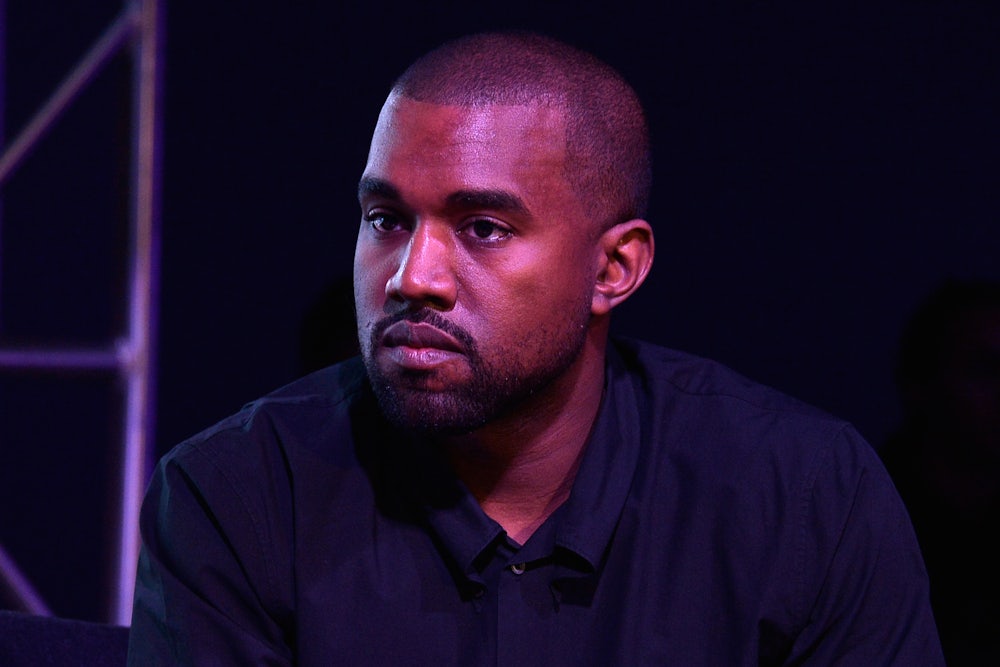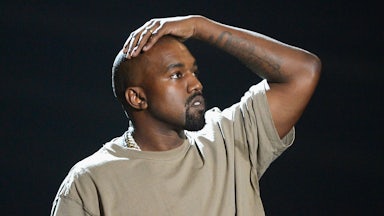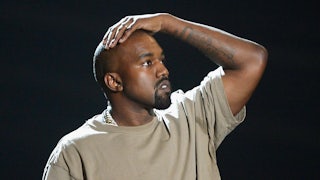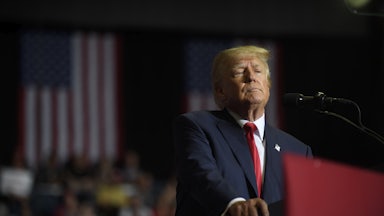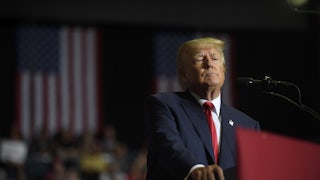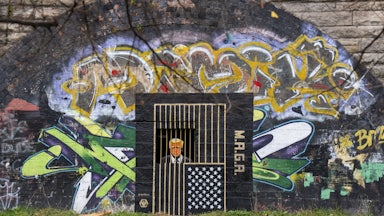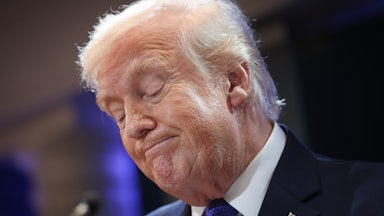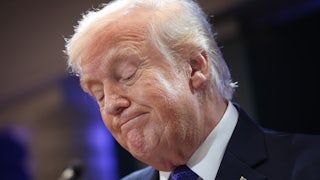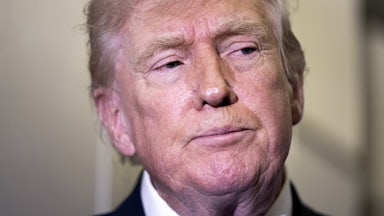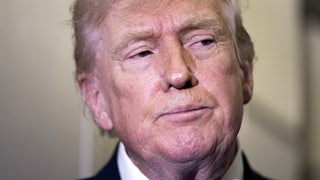A week ago, Kanye West appeared at a Paris Fashion Week show with the right-wing commentator Candace Owens; both were clad in shirts reading “White Lives Matter.” Here we go again, precisely what we’ve come to expect from West in recent years: little more than a troll; another tiresome and mediocre provocation to stir up attention.
West has, in recent years, made more waves with his efforts to trigger the libs than he has with his music. “White Lives Matter” is a slogan associated with hate groups—but he got what he sought: attention and amplification from Republicans and the right-wing media. West earned a sit-down with Fox News’s Tucker Carlson to talk about his “boy Trump” and the response he has received to his overall MAGA-ification—a process that began in 2016, when West endorsed Trump’s presidential campaign onstage in a lengthy rant.
Carlson was hardly alone in celebrating West for not only rejecting Black Lives Matter but promoting the same sense of white grievance and victimization that he has trumpeted on his Fox News program for years. The Republican House Judiciary Committee Twitter account spent hours slobbering over the interview, taking a victory lap of sorts for its new generation of edgelords:
Kanye. Elon. Trump.
— House Judiciary GOP (@JudiciaryGOP) October 7, 2022
What happened next took things to a new level of grotesqueness: West spent the next few days spewing antisemitic vitriol, earning him suspensions from both Instagram and Twitter. West’s posts were unhinged and hateful in a way that couldn’t be explained away. “The funny thing is I actually can’t be Anti Semitic [sic] because black people are actually Jews also You guys have toyed with me and tried to black ball anyone whoever opposes your agenda,” he wrote in one post. He followed that with a pledge to go to “deathcon 3 [sic]” against “JEWISH PEOPLE” the following day. (West’s account was, mercifully, suspended before he could log back on.) In another post on Instagram, he posted a screenshot of a direct message with Diddy: “Ima use you as an example to show the Jewish people that told you to call me that no one can threaten or influence me.”
West’s new far-right friends have largely stuck with him. The tweets from the Republicans on the House Judiciary Committee are still up. Owens—who once said, “If Hitler just wanted to make Germany great and have things run well, OK, fine”—herself leapt to West’s defense in her typical mealymouthed way.
Candace Owens on Kanye West's antisemitic tweet: "If you are an honest person, you did not think this tweet was antisemitic," adding "It's like you cannot even say the word 'Jewish' without people getting upset" pic.twitter.com/tXYOWfI9UE
— Jason Campbell (@JasonSCampbell) October 10, 2022
Fox News, meanwhile, posted an article that West had merely been locked out of his account due to an unspecified “violation” of the company’s policies. After spending such a fulsome number of hours providing him with a platform for his “White Lives Matter” stunt, the network has eschewed coverage of his antisemitism other than to paint it as the product of mental illness. (West is bipolar.)
The effort to sweep the second round of nasty bigotry under the rug after celebrating the initial outpouring is breathtakingly cynical, but not particularly surprising. The fact that West was (at least for now) deplatformed from the social media accounts he was using to traffic hate speech is, in itself, catnip for far-right figures. Some, like Dinesh D’Souza, have tried to treat this as part of the larger campaign about “free speech” on the internet, in this case attacking Twitter for banning him—while also hand-waving the antisemitism. (Maybe soon-to-be Twitter owner Elon Musk welcomes West to the platform after he was banned from Instagram.) West’s outburst can thus be deployed as ready-made ammunition for culture wars, even though what he said was so obviously beyond the pale. (Mental illness is, of course, no excuse for bigotry, but exploiting someone suffering through a “psychiatric episode” to score political points is, nevertheless, plainly immoral.)
But West’s celebrity—still existent despite years of controversy and alienation—is simply too valuable to the right. After decades of being denied the endorsement of prominent celebrities (with the exception of Clint Eastwood and, obviously, Donald Trump) and gritting their teeth about how it didn’t really matter to them, the right cherishes the affection it receives from controversial crossover figures such as Elon Musk and West and doesn’t want to lose them to disrepute—or, at least, wants to continue using them in spite of it. West’s willingness to lend his imprimatur to the pet causes of people like Carlson makes him invaluable, and unjettisonable.
As Philip Bump wrote for The Washington Post last week:
As Black and Hispanic Americans and gay and transgender Americans have been increasingly able to advocate for themselves or point out biases (in part a function of how technology allows people to capture events and helps people organize), the right has interpreted calls for leveling the playing field as demands for preference. All of this gets blurry at the edges, too, of course, but polling has repeatedly shown that White Republicans view themselves as targets of discrimination equivalent to non-majority groups. Carlson and Trump, sharing that sense, highlight anecdotes that reinforce that sense and push back against the group that’s most forcefully calling for the playing field to be leveled. The left. The new elite. So, Carlson sees Ye wearing a shirt that explicitly casts Whites as victims and understands the opportunity. Here’s a member of the inner circle of the elite—a Black man — who’s willing to elevate the idea that White lives are disadvantaged in a way equivalent to Black lives. To validate the victimization and discomfort. Let’s set up an interview.
It could be that West’s antisemitism could make him too toxic for even the most rabid figures in far-right media and electoral politics to continue embracing. Though, coming on the same weekend that GOP Senator Tommy Tuberville, as The Philadelphia Inquirer’s Will Bunch noted, so flamboyantly evoked the racism of the Bull Connor era, it suggests that a Kanye backlash may not come soon. In any case, it hardly matters: One of the lessons that the right has learned from Donald Trump is that there are no advantages to be taken for criticizing one’s own—as long as they’re remaining loyal to the fundamental causes of the moment, be they white grievance in general, or Trump’s prestige among the party faithful. West is thus permitted to be as blatantly antisemitic as he wants, without fear of sanction. He’s clearly bigoted, and clearly suffering, but the right clearly considers him to be a most useful idiot.
